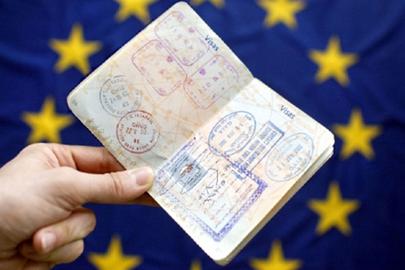A citizen journalist, using the name Venus Omidvar to protect her identity, explores the growing business of fake visas in Iran.
In early summer 2018, Ali met a woman through a friend who had years before worked for an air travel agency. The woman claimed to be in contact with a person named Saeed in Turkey who had helped dozens of Iranians get a Schengen visa and travel to Europe. She told Ali that, after arriving in Europe, Saeed’s clients asked for asylum and, after spending some time in a camp and putting a good case together, had been successful.
Ali, who was suffering from back-breaking financial difficulties, decided to follow this route. He had heard about the difficult conditions for asylum seekers in Europe, but when he conferred with his wife, they both decided that although they would have a difficult time for a period, afterward their two children would have the chance to grow up in a European country.
It was agreed that they would give Saeed 100 million tomans per person, or 400 million tomans for the whole family (close to $40,000 at the open market currency exchange rate as opposed to the “official” rate) and he would get them Schengen visas in less than two months without them having to go to the German embassy and give their fingerprints. After the visas were ready, the same woman would get them tickets and tell them when to leave Iran.
Ali was no longer hesitant. He gathered the money by selling some of the merchandise in his shop and deposited it into Saeed’s account in Turkey. He then waited for the next step. During a phone conversation with Saeed, he was told to be ready to leave Iran by November. Saeed convincingly assured Ali about their chances of success and Ali and his family were all prepared to go. They had even put all their furniture and household items up for sale.
In October, Saeed told them that both the visas and the tickets were ready. He asked Ali to send another 50 million tomans ($4,000) so he could send them the visas and the tickets. He even sent a picture of the ticket to Ali and his family. They had no had no doubt that, come winter, they would be in Europe, leaving their stressful life behind.
But two weeks before the scheduled departure, after Ali and his family had said their goodbyes to friends and family, the woman from the travel agency called and told Ali that the trip had been postponed. After several months of postponements week after week, it became obvious that the whole thing had been a scam. Ali went to his friend and the woman who had introduced Saeed to him. Many heated words were exchanged. The woman claimed she was only a go-between and none of the money had come to her. The only thing that she gave Ali was an address for Saeed in Turkey. In the meantime, Saeed's phone had gone silent.
The Sought-After Schengen
Ali is not alone. In recent years many people, without any contracts or commitments, have trusted individuals who claim they have strong contacts with people in embassies and can get them visas.
"Getting a Schengen visa has become more difficult in the last couple of years but if the documents are complete we can file the application and hope the visa will be issued," said Homa, a woman in charge of procuring visas at a travel agency in Tehran. According to her, the documents generally required are as follows:
— an Iranian passport
— the typed, completed and signed application form from the embassy of the destination country
— a color photo
— medical insurance for the whole duration of the visit to the Schengen area
— ticket and hotel reservations
— a bank statement for the applicant and a detailed transactions list for the same account for the last three months
— any other certificates showing the financial means of the applicant, including deeds to a property
— translation of the individual’s national ID card
— translation of the first page of social security insurance, certificate of employment or the person’s most recent contract, along with pay stubs for the last three months
— certificate of insurance and a letter from the person’s employer (for government employees)
— commercial registration certificate and insurance certificate or its equivalent (for business people)
— the certificate of membership to an officially-recognized professional association (for artists)
— school certificate and a consent letter from parents (for students)
— general documents attesting to the social and financial situation of unemployed applicants (e.g., certificate of marriage, savings account certificate and deeds to assets)
All the required documents must be translated, signed and sealed by translators authorized by Iran’s Ministry of Justice. Homa strongly recommends that applicants either go directly through the embassy of the destination country and schedule an interview or act through the visa services of an authorized travel agency. She advises to avoid dealing with a third party to get visas.
The Con Man’s Convincing Pitch
Farimah is another Iranian who has been fleeced by a visa scam. She had been quarreling with her husband and his family for years to get a divorce, but since they could not come to an agreement she decided to get together whatever she had and get to the UK through a person named Amir, a British resident who claimed he had acquired visas for dozens of people. To convince her that it was all on the level, Amir also provided her with the phone numbers of two or three people who, he claimed, had come to the UK for asylum and had a rather comfortable life in a family camp.
After talking to those people, Farimah made her decision and sent Amir 80 million tomans ($6,300) to get her a Schengen visa so that she could travel to one of the countries in the Schengen area and then find a way to get herself to the UK. After the exchange rates of hard currencies started rising last summer, Amir claimed that she must send 50 million tomans($4,000) more if she wanted to get to the UK because his partners within the embassies were demanding more money. Farimah did not have much money left but she somehow managed to get together 20 million tomans ($1,600) and they agreed that she would pay the rest when her visa and ticket were ready. But now about eight months have passed and there is no sign of her visa.
Farimah left Amir numerous messages, begging him to get in touch and telling him that she was in deep financial trouble and had decided to cancel her trip altogether. At last Amir sent her a message that part of her money had been paid to the intermediaries and could not be retrieved but that he would return the rest before the summer was over. She does not know how much she will get back.
Fighting Back on Social Networks
Recently a Telegram channel using the name “Introducing immigration and asylum frauds” has been launched, attracting more than 2,600 subscribers. The channel features dozens of fraud stories similar to those of Ali and Farimah, along with information about the scammers and, in some cases, their photographs, which could perhaps help find these people, or at least save others from falling into their traps.
One of the stories is about a group of 20 people who each gave $1,500 to one individual in return for getting them visas without them having to give their fingerprints. They met this person in the offices of an immigration services agency and signed an agreement on a piece of paper with a forged letterhead. A few months have passed and the person who was supposed to help them has disappeared. The agency claims that the individual was not their employee, and that the letterhead is not theirs, so the company holds no responsibility for the fraud.
Is there a legal recourse for dealing with this type of fraud? “Investigating such cases is very difficult and time-consuming because there is not enough evidence and I dare say that in most cases it gets nowhere,” a law expert told IranWire. “If there is evidence that money has been transferred from the account of the victim to the other person’s account — any evidence, even a short agreement, a text message, messages exchanged through chats or recorded phone calls through traceable phone numbers — perhaps the case can be pursued and if the judge finds for the plaintiff, the account of the [accused] can be frozen and the money can be returned.”
But what if the account the person deposited in is in a foreign country?If the court rules in favor of the plaintiffs, the lawyer says, then they can take action through the embassy of that country, in which case “first that person is given two months to return the money and if he fails to do so his account is frozen.”
The lawyer we talked to has recently been involved in a number of immigration fraud cases. “The economic situation of the country is so bad that some people will do anything to get out of Iran and get to Europe,” he said. “I asked a client of mine who has lost everything because he trusted a con man to get him a European visa why he had trusted the guy. ‘I read the news and saw that if I wanted to go to Europe illegally through Turkey I might lose my life,’ he said. ‘Somebody told me that a certain guy could get me a visa. I did not do any investigations but gave him the money so I could leave without hassle. But with the situation as it is I must go to Turkey and cross the border illegally.”
In the last couple of years, despite tons of news published every day about the difficult situation for Iranian refugees in various countries, Iran’s runaway inflation and political and financial pressures have forced many Iranians to scrape together money however they can and seek refuge in a western country. A few have succeeded despite the dangers and overwhelming odds, but many have been stuck where they are, perhaps still hoping and dreaming. They are natural targets for visa scammers.
Related Coverage:
Joining Anarchists to Fight the System, July 2, 2019
“I Left My Daughter With a Human Trafficker”, June 28, 2019
Living Among Traffickers Has Consequences, June 21, 2019
"I just want to leave this misery", May 31, 2019
Moria Camp and its Prison on Lesbos Island, May 22, 2019
In One Weekend, More than 50 Refugees Picked up in the English Channel, May 22, 2019
How Human Traffickers Swindle Refugees, May 13, 2019
The “Hellhole of Athens”, April 3, 2019
Asylum Seekers in Greece: A Life of Fear and Suffering, January 29, 2019
Iranian Refugee Rights Activist Faces Long Prison Sentence in Greece, January 28, 2019
From Asylum Seeking to Asylum Dealing, January 23, 2019
French Police Raid and Destroy Iranian Refugee Camp in Calais, January 11, 2019
Meeting with a Human Trafficker in Istanbul, December 18, 2018
Iranian Ambassador Shrugs Off Responsibility for Refugees, December 11, 2018
From France to Turkey: Human Trafficking and Asylum Seekers, November 13, 2018
visit the accountability section
In this section of Iran Wire, you can contact the officials and launch your campaign for various problems

























comments